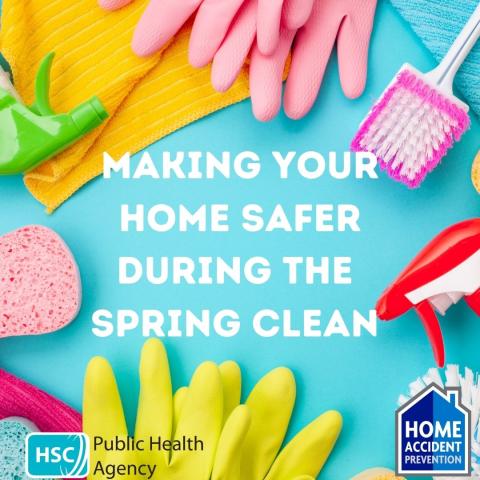Making your home safer during spring clean

Most people’s spring cleaning to-do lists focus on clearing out unwanted items and freshening up the home, this year the Public Health Agency (PHA) is urging people to put a focus on steps that will help make their homes safer at this time.
“We are asking people to add a few tasks to the spring cleaning to-do list that are aimed at keeping their home not only tidy but safe for them and their family,” said Hilary Johnston, Health and Social Wellbeing Improvement Manager with the PHA.
“More accidents happen in the home than anywhere else and many of the jobs people will be doing around their homes can lead to trips, slips and falls.
“It is also, unfortunately, a time when Accident and Emergency departments, usually see a rise in DIY and gardening injuries, so it is important for people to take the time out to make sure that they think about their safety. This will reduce the risk of preventable accidents and make the home environment as safe as possible,” she added.
Top tips for the spring clean
- Examine every blind in your home. If they have a looped control chain or cord and do not have a safety device fitted, then you can easily install one of the many devices available.
- Ensure that all operating blind cords and chains cannot be reached by children.
- Move cots, beds and any furniture away from windows and blinds – remember children love to climb.
- When cleaning out kitchen cupboards and cabinets it is important to put household cleaners and medicines away to avoid accidental poisoning or chemical burns. Make sure they are out of the sight and reach of children in a locked or high-level cupboard, and clean up any spills.
- Read labels for any special precautions required when using cleaning products.
- If using products which contain bleach, or have a strong smell, it is advisable to ventilate the room.
- Check that televisions, chests of drawers and shelving units are securely anchored to the wall as bulky, heavy furniture can seriously injure or even kill a small child if it falls on top of them.
- Test smoke alarms and carbon monoxide detectors.
- If carrying out any DIY, check your ladder’s condition before use.
- Stop and disconnect all electrical appliances and tools before repairing or cleaning them; only use tools/materials/products in accordance with their instructions.
- Always supervise children, especially when power tools and lawnmowers are being used, and tidy up all equipment straight after the job is done.
The Public Health Agency would also take this opportunity to remind people about the importance of keeping rooms well ventilated to help reduce the risk of catching or spreading COVID-19.
For helpful tips on home safety visit www.rospa.com and
www.pha.site/homeaccidentprevention
